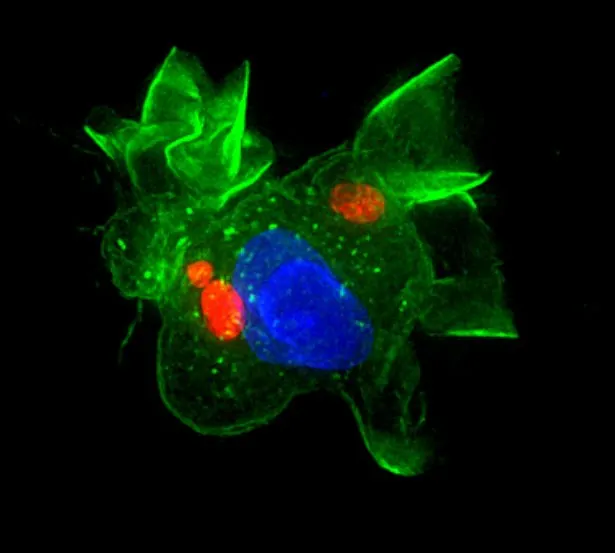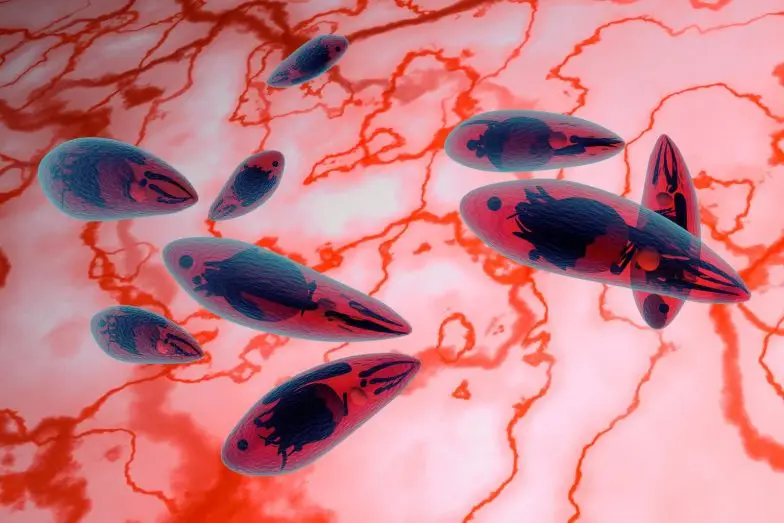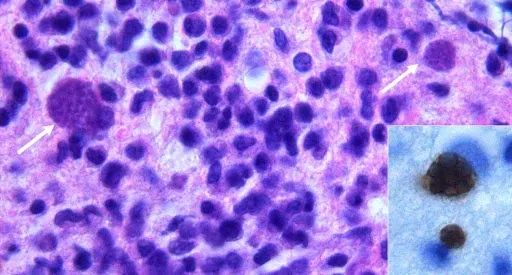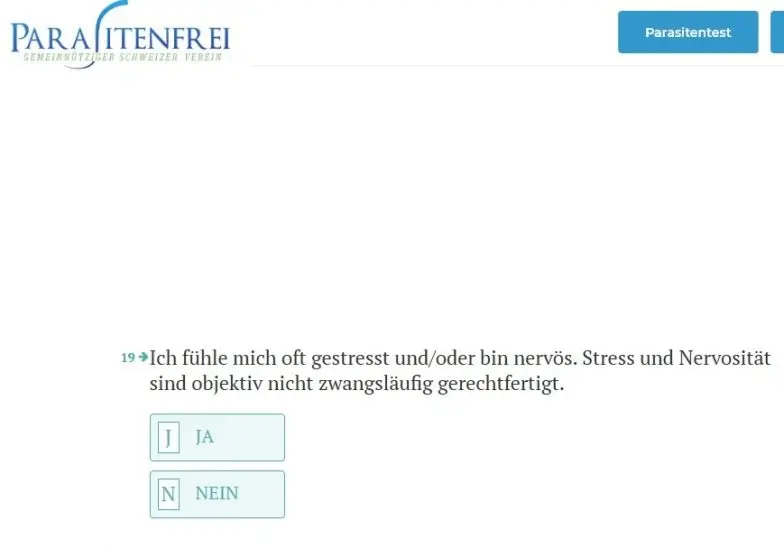Externally controlled by parasites
Truth or fiction?
Dear reader,
well-known scientists such as Dieter Broers, Dr. Andreas Noack or Dr. Jaroslav Flegr have already dealt with the question: Can parasites control humans externally ? In this article we illuminate this exciting topic on a scientific basis .
We clarify the following questions:
-What does it mean to be “ externally controlled “?
– Are parasites biologically even capable of external control ?
-How can parasites gain control of the host’s brain ?
-Parasites: External control in humans really possible?
-How can you determine whether you are externally controlled by parasites ?
-What can you do against external control by parasites ?
Parasites: Mind Control in Humans –
An exclusive information video from the Swiss Parasite Free Association –
Take a look here the entire parasite academy free of charge.
What is "externally controlled"?
When the topic of “parasites and external control” comes up in our lectures, we always start by explaining what a so-called “ external control ” actually is . Our scientists have developed a definition for this:
“If one living being manipulates another in a way that corrupts free will, one speaks of external control.”
Now the question arises: Can parasites make a person mindless ?
After interdisciplinary research, working through studies and specialist literature and an intensive discourse, we have found a consensus in the Swiss Parasite Free Association. We are sure: Yes, parasites are able to control humans from outside . In this article we will show you how we came to this research result and provide the scientific evidence for it.
The author of this article is Julia Herbst , Public Relations Swiss Parasite Free Association . The purpose of the association is interdisciplinary research in the field of “Parasites in humans” as well as public education on the subject. For this purpose, the working group of the association wrote the most extensive meta-study worldwide on the topic and published it here:
Can parasites control another living being in principle?
To investigate this question, we will initially focus on the animal world , because the manipulation by parasites has been well researched in animals. Here are two impressive examples :
1.) Unwilling suicide
The hairworm Spinochordodes telinii spends its youth in the body of a cricket . There the parasite develops , completely unnoticed, until sexual maturity . Hairworms mate with their conspecifics under water . Crickets are not known to voluntarily visit a body of water. However, on the night in which the sexual maturity of the parasite sets in, the cricket runs to the nearest body of water and jumps into it . The insect drowns and the hairworm leaves the host to mate. [1]
Watch this spectacle of nature in the video :

Why did the cricket behave so atypically ? The hairworm externally controlled the cricket for its own purposes and reversed the natural behavior of the insect . Two French parasitologists, David Biron and Frédéric Thomas, found that the hairworms change functions in the insect’s central nervous system by exchanging proteins that they produce with proteins in the insect’s nervous system. David Biron described the process as follows: [2]
“The Spinochordodes tellinii can speak into the host’s brain with the help of its molecules.”
We would like to emphasize this at this point, as it is of the highest significance : The parasite is able to “ speak into the host’s brain ” , i.e. to transmit direct commands to the host. The host does not notice his change in behavior and cannot defend himself against it. So he is mindless .
2.) Collective suicide by ants
The liver fluke, also a typical parasite of humans , is able to control not only one host, but many . Its larvae migrate through several intermediate hosts until ants (forest, path or horse ant) become infected with the liver fluke via snail slime.
The parasite migrates into the central ganglion (nervous system of the brain) of the ant and can there exercise complete control over the ant’s behavior . The cow is the final host of the liver fluke. This is why the parasite steers the ant onto the highest blade of grass in the meadow, which grows near cows.
The unbelievable: All infected ants climb the blade of grass at the same time and bite themselves there with their mouthparts until they are eaten by a cow . [3]
You can also watch this natural spectacle in the form of a video :

You can find more examples of external control by parasites on our main page:
How do parasites get into the brain?
The blood-brain barrier protects the brain from pathogenic agents, as these cannot cross the barrier. [4] Until 2012 it was completely unclear how parasites were able to overcome this barrier in order to penetrate the host’s brain for manipulation purposes. A research group from the Francis Crick Institute, London, was able to visualize the path of a parasite into the brain for the first time using modern imaging methods . [5]

But first things first: The unicellular parasite Toxoplasma Gondii lives in low-oxygen soil. There mice become infected. The brain parasite penetrates the mouse’s brain and completely changes the behavior of the rodent there. The perception of risk decreases due to the formation of cysts and the influence of dopamine causes the mouse to lose its innate fear. Changes in the olfactory cranial nerve also make the mouse feel attracted to cat urine. [6]

The small mammal loses its natural fear of cats by influencing the Toxoplasma Gondii and begins to stay near them . What must happen happens: the parasite reaches its destination. The mouse is eaten by the cat and is infected with it . Humans become infected through contact with cats . [7]
Toxoplasma Gondii: pulling the cord in the human brain –
An exclusive information video from the Swiss Parasite Free Association –
Look at you here the entire Parasite Academy free of charge.
Dr. Jaroslaw Flegr points out that all people who have had closer contact with cats in their life are infected with Toxoplasma Gondii . According to the Robert Koch Institute, 60% of people in German-speaking countries are already infected with brain parasites. [8]

Once in the human body, the protozoan makes its way into the bloodstream. There it takes over an immune cell and controls it like a vehicle in the direction of the brain . The blood-brain barrier allows the immune cell to pass and the parasite has thus managed to enter the human brain unhindered . He sits in the neocortex (“human control unit”) and from this position has the most diverse manipulation possibilities . [9]
The molecular biologist Prof. Antonio Barragan was able to visualize this process with the most modern technology. Now look at the Toxoplasma Gondii in action, how it hijacks dendritic cells and uses them to cross the blood-brain barrier:

You can find out more about Toxoplasma Gondii and how it works in humans here:
Parasites: external control also possible with humans
That parasites are able to decisively manipulate humans is not only known in the world of science, but has also been the subject of numerous popular scientific publications. The weekly newspaper DIE ZEIT had the headline in its 12/2014 issue: “ People are also controlled by neuroparasites. ” [10]

There are some species of parasites in humans that are capable of influencing the nervous system and thus influencing human behavior . A prime example is the Toxoplasma Gondii. However, there are far more parasites with these abilities , for example: Paragonimus, Schistosoma, Trypanosoma, Naegleria fowlerii, Sparganosis, Acanthamoeba histolytica, Echinococcus or Balamuthia mandrillaris. [11]
Parasites in the brain: why 60% of people are affected –
An exclusive information video from the Swiss Parasite Free Association –
Look at you here the entire Parasite Academy free of charge.
Der Toxoplasma Gondii is the most widely researched and in parasitology we now know exactly how he manipulates people and how this shows itself in behavior :
The parasite can be used for depression , memory problems , “ fog in the head “, chronic stress , Nervousness , relationship crises , parasitic behavior , violent crimes , increased willingness to take risks , introversion and changes of character .[12]

The impact on human behavior on a biochemical level is so diverse that complete control of behavior is possible, as is the case with crickets and ants in the examples. Russian researchers found that the thoughts and thus the behavior of humans under the influence of parasites can be completely different . Therefore, according to the definition, we speak of a external control . [13]
You can find out more about how the Toxoplasma Gondii changes the biochemistry of humans and thus controls their behavior here:
Externally controlled by parasites? The test!
In the previous chapters it became clear that parasites are basically able to control the host externally and can do this in humans too. Does that mean that now every person is controlled by parasites ?
First of all, we recommend anyone wondering whether they are affected to carry out the free parasite test developed by us. You will receive your test result in a few minutes .

Now run the parasite test once:
You now have a assessment as to whether there might be parasites in your brain . The next step should be to evaluate whether these are already influencing your actions . External control by parasites is not easily noticed . It requires an increased awareness . This is how it works :
Pretend to step out of your body and see yourself as a third person . So imagine you are observing yourself and your thoughts from the outside . No longer perceive the thoughts as “your thoughts”, but as if you could read out the thoughts of a third person . Now compare the thoughts with the actions in everyday life:

Check in every situation whether you are really in control of your decisions . For example, when you go to the fridge and make a dietary decision, watch yourself and your thoughts . This also works in interaction with other people – sometimes you can’t help but say or do something even though you don’t want to ? If so, it stands to reason that there is external influence .
You can find more information and examples here :
External control by parasites: what to do?
If you have now recognized for yourself that you are controlled by parasites , the next question is how great your suffering is and how much you prevent this influence want. Because the parasites will try to dissuade you from doing something about them .
As already explained, the parasites can influence exercise on thoughts . And thus they can also whisper doubts and make you not take any action against them .

If you have enough mental strength and can resist these thoughts , you should start immediately with regressive measures. Because only now do you have the necessary momentum and the willpower to start. The parasites will try to influence you so that you not start immediately, but postpone the decision . In our experience, everyday life will intervene and you will likely never begin removing the parasites. Now or never .

The Syrian rue is touted as a remedy for parasites in the brain. At least since Dieter Broers’ “Heaven betrayed – Return to Eden” it has been “on everyone’s lips”. Our scientists have carried out various studies and found that ingesting the Syrian rue is ineffective if it is ingested in isolation.

Only as part of a systemic parasite cure does it show an effect. However, only if the rue is synergistically combined and the diet is adapted to the plant powder. This once again confirms our research results :
It is not possible to act isolated against parasites. In other words, induce a local discharge, only in the intestine or only in the brain. The liberation from parasites must always be systemic, i.e. affecting the entire body.
In our specialist article: “ Parasite Cure: The Ultimate Guide ” you will find out how a parasite cure should be structured and what to look out for:
“I feel like I am being controlled by someone else!” We often hear that. A parasite cure usually helps.
The results after performing a parasite cleanse are enormous. This applies in particular to the aspect of external control. We get dozens of feedback from people who have regained their self-determination by getting rid of parasites . We have published some testimonials here :
We received a particularly impressive video report from Toni (28). He tells his story how he perceived the parasite control and a parasite cure ultimately helped him :

We wish you every success and all the best
Julia Herbst
Parasite-free Swiss association

